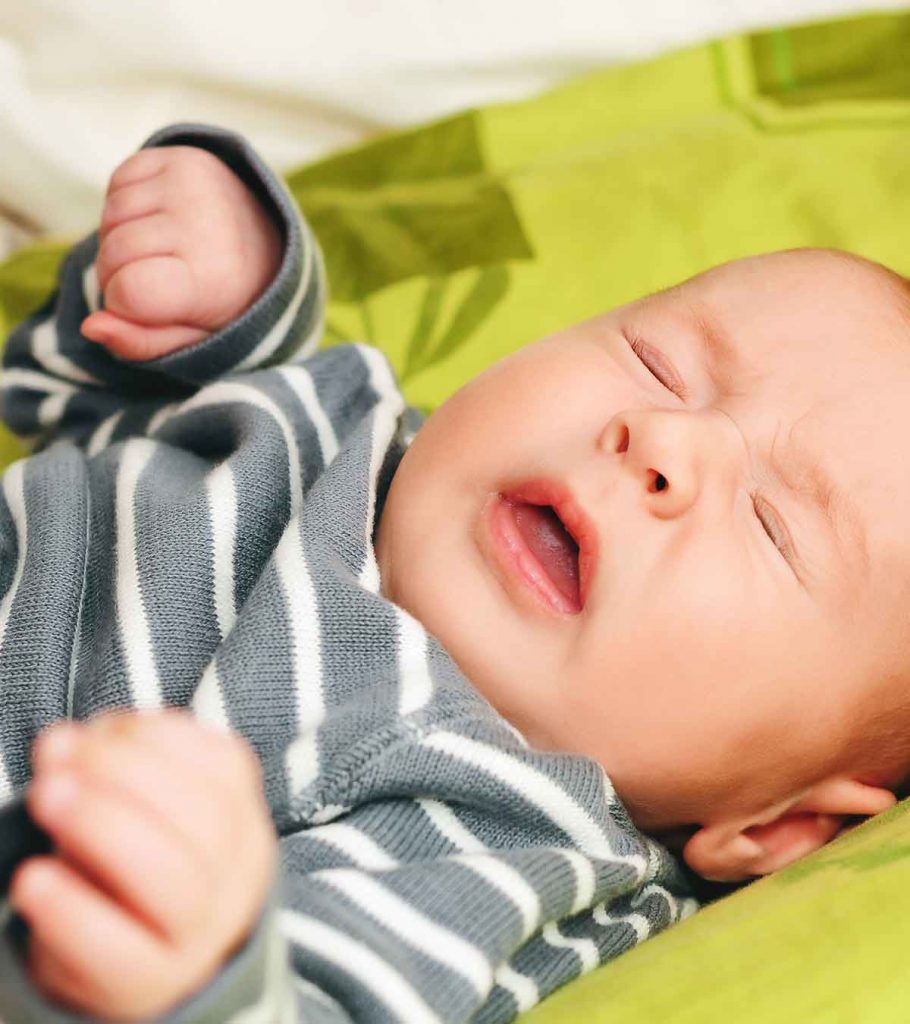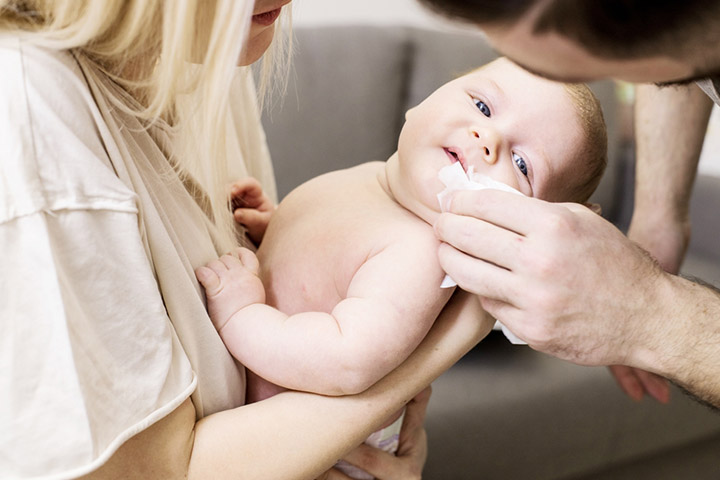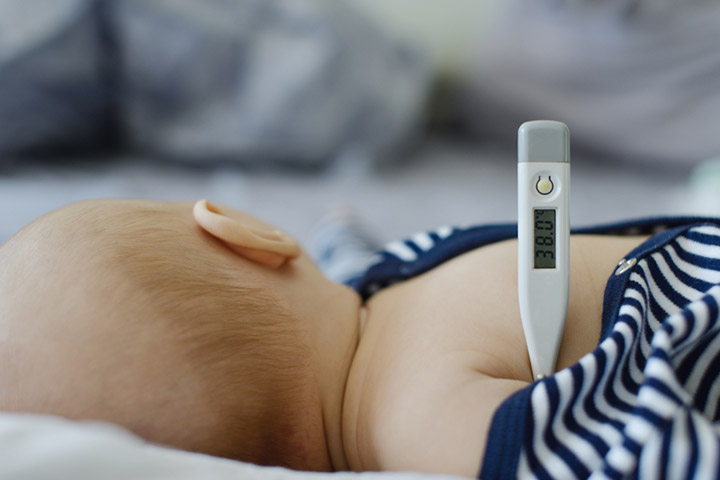Newborn sneezing is a defensive mechanism that helps newborns eliminate inhaled irritants, such as dust, dirt, and germs from the airway. It is a common reflex that babies have right from the time they enter this world (1).
Generally, all babies sneeze, but some may sneeze less while others sneeze more. Yet, on average, babies sneeze more than adults due to their small nasal passages that require frequent cleaning. However, consulting a healthcare professional such as a pediatrician would be advisable if you notice additional symptoms, such as a runny nose or fever.
Read on as we tell you about the causes of sneezing in babies and when sneezing is not normal.
Why Do Babies Sneeze?
Sneezing is one of the body’s natural defenses against illness (2). It is basically a protective reflex provided by nature, to discard any mucus or foreign body. However, there are several other reasons why a newborn or an infant would sneeze:
- Clearing germs and irritants from the nose: Sneezing is the body’s natural reflex to clear nasal passages that have an irritant within. For a baby, anything including dust, smoke, milk that accidentally got into the nose, and even dry air can be an irritant. A sneeze helps them get rid of these irritants as well as germs.
- Expel mucus: Infants cannot blow their nose like adults do (3). Therefore, when they have nasal congestion due to mucus, they will sneeze as a natural reaction to throw out the mucus.
- Short nasal passages: Newborns are obligate nose breathers, which means they primarily depend on their nose for breathing and do not prefer breathing from the mouth (4). However, the nasal passages of the baby are tiny, and even the smallest obstruction in it can affect breathing. For instance, a baby may sneeze even when their nose presses against the chest of the mother while breastfeeding.
- Dry air: Cold weather, which at times gets excessively dry, and the overuse of indoor air conditioning, could rapidly dry nasal moisture. This is acutely bothersome for babies and leads to sneezing and a runny discharge.
- Regurgitated milk: For a few days after birth, babies regurgitate milk. This backflow of milk leads to irritation of the nasal lining. This, at times, could lead to swelling in the nasal passage, which makes those stuffy and the little one sneeze..
- Deviated nasal septum:A significant number of babies are born with nasal septum deviation (5). Nasal septum deviation is a condition in which the thin wall between the nasal passage is displaced to one side. This leads to narrowing of one side of the passage and impacting the breathing (grunting sound during breathing), which in turn causes a stuffy nose.
A newborn baby is most likely to sneeze due to the above reasons. However, if they are sneezing too frequently, you may check for signs that may not seem normal and warrant treatment.
What Sneezing May Not Be Normal?
Frequent sneezing, when accompanied by one or more of these conditions, could point to a problem that requires medical attention:
- Fever: A body temperature of above 100.4°F (38°C) is considered a fever in infants (6). If the baby has a fever along with sneezing, then it might be due to an infection of the respiratory tract.
- Cold: The symptoms of cold include a runny nose, coughing, lethargy, and sometimes fever. A common cold is known to cause sneezing too (7).
- Coughing and wheezing: If the baby coughs, sneezes, and wheezes, then they may have an allergy, and possibly inhaled a potential allergen, such as pollen, dust or even perfume smell (8). This causes the body to react with sneezing and other symptoms of an allergy.
- Fussiness, lethargy, and poor appetite: If the baby is fussy, colicky, lethargic, and shows little interest in eating, then it could indicate some illness generally of the respiratory tract.
- Sneezing with yellowish-colored discharge means infection from a virus or bacteria.
- Rapid bursts of sneezing:Maternal usage of narcotics during pregnancy can result in neonatal abstinence syndrome (NAS) – a type of drug withdrawal condition (9). According to the Healthcare Cost and Utilization Project (HCUP) reports released by the Centers for Disease Control and Prevention (CDC), about six newborns were diagnosed with NAS for every 1000 newborn hospital stays. One of the symptoms of the syndrome is sneezing in bursts of three to four in fixed intervals (10). For example, the baby will sneeze three to four times more rapidly in every half hour or an hour.
See a pediatrician if the baby displays any of these symptoms along with sneezing. If the baby’s sneezes are continuous and frequent, take them to a doctor, who can diagnose the cause behind the sneezing. Saline drops can clear the nasal passages.
Newborn sneezing is a natural defensive method to eliminate any irritants in the airway. Hence, if your baby sneezed a few times, do not panic since it might be a reflex to eliminate any potential allergens. However, consult your medical professional for prompt medical care if the sneezing is accompanied by other symptoms such as a runny nose, wheezing, or coughing. Further, note any signs of infections such as yellow discharge or fever. Maintain hygiene and try to eliminate any potential allergens around the house. Simultaneously, use hypoallergenic products to prevent the sneezing reflex.
Key Pointers
- Newborns mostly sneeze to expel mucus or foreign bodies from their nasal passage.
- However, they may also sneeze due to short nasal passage, deviated nasal septum, dry air, etc.
- Consult a doctor if the baby experiences frequent sneezing with conditions such as fever, cold, wheezing, poor appetite, etc.













